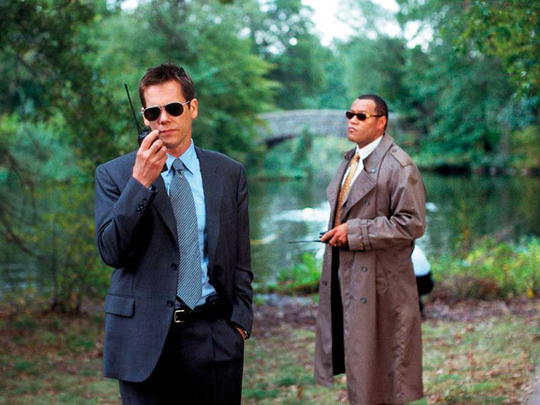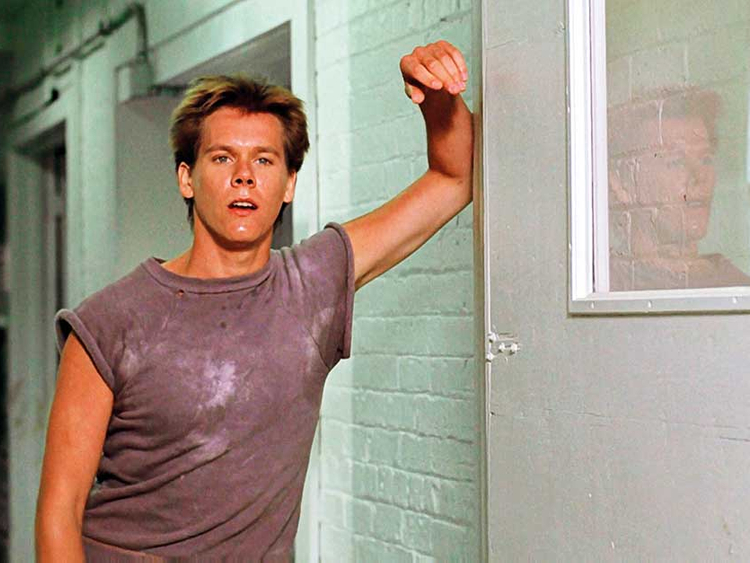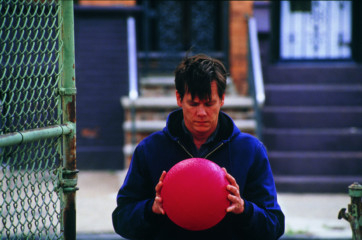
Everyone knows the shtick about Kevin Bacon. You know, the theory that anyone in the entertainment business can be connected to him by, at most, six removes: the Six Degrees Of Kevin Bacon. So, to take an actor at random, Dolly Parton: Parton voiced the animated film Gnomeo And Juliet along with James McAvoy, who starred in 2011’s X-Men: First Class, in which Bacon played the bad guy. It works even with actors from previous generations, such as, say, Gene Kelly: Kelly directed 1967’s A Guide For The Married Man with Walter Matthau, who appeared in JFK, in which Bacon played a crooked gay hustler. This game has been entertaining film nerds and stoned students for more than 20 years, and has given Bacon a kind of meta fame. But it is rarely noted that it is also a huge compliment to him, acknowledging how long and varied his career has been. “Hmmm, I don’t know if I’d call it a compliment,” Bacon says in his surprisingly deep and gravelly voice, when we meet in London. Of course it is, I say. It’s a testament to his longevity. “Right, right, my longevity,” he says, dismissing the praise with sarcasm and a smile.
At 58, Bacon still looks absurdly trim in his dark jeans and black top, and has the kind of terse gruffness that makes me think of a cowboy. But he is remarkably engaged and honest for someone who has spent half his life on the A-list, and makes pleasingly little effort to hide his begrudging tolerance of the Six Degrees game: “I thought it was a joke at my expense: ‘Can you believe, in less than six steps we can connect Kevin Bacon to Laurence Olivier , one of the greats?’” Wait, I can do this. Olivier was in Dracula with Frank Langella , who was in Frost/Nixon ...
“No!” he interrupts, definitely less keen on the game than me. “I thought it was like, ‘On the one hand, you have this...” – he holds one of his hands down near the floor – “ ‘and on the other, you have this!’” He holds his other hand high above his head. That’s totally not what it’s about! He shrugs: “That’s how I felt.”
Now he is starring in Amazon Prime’s new drama I Love Dick, created by Transparent’s Jill Soloway, and loosely adapted from Chris Kraus’s cult novel. Getting a regular gig such as this, on a platform such as Amazon, with its seemingly unlimited funds, is these days pretty much the dream for any actor who has ambitions beyond donning a superhero outfit. “Well, let me tell you, I think career planning is an oxymoron,” Bacon says, which may be true. But an even bigger one is a former teen pin-up who becomes a credible actor.
Bacon, who has been a bona fide celebrity since he danced to Kenny Loggins in the endearingly cheesy 1984 movie Footloose, is the only actor from that golden era of teen films to have parlayed his early fame into a lifetime of steady work, while maintaining a stable homelife. Tom Cruise and Rob Lowe have also lasted the distance, but both have had their share of scandals, whereas Bacon has remained gossip-free and happily married to his wife of 30 years, the actor Kyra Sedgwick, with whom he has a son and a daughter. A telling illustration of this extraordinary career can be seen in the 1982 ensemble movie Diner, in which a 23-year-old Bacon is so good in the supporting role, as the self-destructive rich boy Fenwick, that he nearly steals the movie from Mickey Rourke’s more central performance. The film was conceived as a launchpad for a new generation of actors, but of all the men in it – Rourke, Daniel Stern, Tim Daly, Paul Reiser – it is Bacon who has been the most consistently successful.
Why does he think he has outlasted almost all his peers? “Honestly, I don’t know,” he says. “I mean, there’s staying a little bit focused on something outside your own legend, and riding out the low points in your life. But there have been a couple of moments when I said to myself, ‘You’ve got to do this or that.’”
One of the first of these came at the end of the 1980s, when Bacon realised that, along with almost all the teen actors from that decade, his time as a leading man had passed. So he decided to look for small parts in prestige pictures as opposed to starring roles in schlock.
“When I made the choice not to look for things where my name was above the title, that started a whole new thing for me, with JFK, A Few Good Men, Apollo 13 and The River Wild. I said to myself, ‘Think about Diner. You’re not the guy – you’re the other guy. But if you commit to it, you’ll do a good job.’”
Bacon came to be seen as a likeable and safe pair of hands, one who could hold his own against, say, Cruise and Jack Nicholson’s pyrotechnics in A Few Good Men. In 2003’s Mystic River, he provided a welcome breath of naturalistic air alongside Sean Penn and Tim Robbins’ more screen-chewing antics. In Frost/Nixon, he took the small role of Jack Brennan, Richard Nixon’s post-resignation chief of staff, and, in a very subtle and restrained way, turned him into the embodiment of the conservative establishment trying to keep the faith with the disgraced president. Still, he must have had to keep his ego in check, playing the supporting role to actors who had been his equals in the 80s? Bacon has no truck with that kind of nonsense: “A movie like Star Wars is fun, but that wasn’t the kind of movie I was interested in as a kid. I was interested in, you know, Michael Cimino, Sidney Lumet, John Cassavetes: these were the kinds of things I wanted to do. Finding a place in movies to do that kind of acting now is very difficult. So I’m just grateful for the gigs.”
And presumably movies such as 2004’s The Woodsman, in which he played a paedophile trying to control his criminal urges, don’t get made that often any more? “Very rarely,” Bacon says. “And if you make a movie like that, and nothing’s happening on the awards side of things, it’s just going to go away.” Is that a change he’s noticed in Hollywood during his career? “Yeah, for sure. Now we’ve got movies that make $1 billion, and then there are a couple of tiny little things like Moonlight. But there’s very little in the middle. Where’s The French Connection?” The answer, of course, is on TV. About five years ago, Bacon had another moment when he knew he had to do something different, and told his agent to start sending him TV scripts.
“Before, my managers knew never to mention a TV series to me, because they knew how furious that would make me,” he says. “I’d look at it like a vote of no confidence in my movie career, that I was going to be sent off to the television graveyard. But at a certain point I looked at the stuff I was consuming – The Sopranos, The Wire – and I realised the writers went to TV because they’d been screwed by the movies. It was still a difficult moment for me. I mean, my hand was shaking. Then they sent me three scripts, and they were three of the best scripts I’d seen in years. I was like, ‘Schmuck, you could’ve jumped on this years ago!’”
He first played the lead in the well-received FBI series The Following, which ended after three series in 2015. And then Dick turned up. The most reductive way to describe Kraus’s 1997 semi-autobiographical novel is to say it’s about a woman called Chris Kraus who becomes sexually obsessed with an academic called Dick, much to the initial delight and eventual horror of her husband, Sylvere. Bacon plays the desired Dick, a man so parodically masculine, he thinks a brick is a work of art. “A straight line is perfection,” he tells Chris (played by Kathryn Hahn), who is more of a chaotic scribble.
Dick is based on the real British cultural theorist, Richard Hebdige, who has said he was “appalled” by the book, and presumably isn’t much happier about the TV series (he declined to comment for this article). Bacon says he can relate to the character of Dick, given that he, too, is a famous man who has been objectified by women he barely knows. Does he feel a little sorry for Hebdige? “Sure,” he says, “although I guess feeling sorry is a little different from understanding his point of view. It’s a question of living your life, and something kind of comes out of the blue to turn you into a public persona when you haven’t made that choice in your life. But when it comes to celebrity, like for myself, we have no one to blame but ourselves, because we have spent a lifetime trying to create this lack of anonymity.”
I interview Jill Soloway, who created and co-directed I Love Dick, the week before I meet Bacon, and the dynamic between the two sounds not a million miles from that between Dick and Chris. It’s not that Soloway was in love with Bacon, more that he had to learn how to bend his straight lines to her scribble-like style of directing, which she characterises as “film-making without a masculine intention”. This means an emphasis on improvisation, throwing out traditional things such as shoot schedules, and doing bonding exercises instead.
“I was a little resistant at first, because I’m practical and I like to know what I’m doing that day,” Bacon says. “But Jill would go, ‘Let’s not do that–- we’ll do something else.’ And that was challenging. I’m at the point in my life where there’s nobody on a set who’s spent as much time on a set as me, so to be thrown back into what felt like acting school, was, well, you know?” Other Soloway techniques include the idea that each scene should be epitomised by a single word and then working around that word (“Yeah, I can’t get my head round that,” Bacon says with, I suspect, some understatement.) Another is what Soloway calls “doing box”, which involves standing on a box and sharing what you’re going through outside of work emotionally. What did he share? “I can’t remember, but I can tell you it was pretty much my worst nightmare.”
Why?
“Because I’m not a public speaker. I don’t even like making toasts. It hits me in a way I can’t really explain. I’ve literally sat with a therapist to try to figure out what that is, because I’m such a public persona.”
Has he been through a lot of therapy?
“Some, not a lot. I didn’t find it that helpful. Well, hmm, maybe if it was working for me, I’d still be in it...”Or it worked, and so he’s not?
“Exactly!” he says, with a rare belly laugh. Anyway, Bacon says he ended up “loving” Soloway’s approach, and he’s hoping Amazon will let them make a few more series. But he might well have bailed in the early difficult days had it not been for his wife. “She said, ‘You’re not too old to feel things in a new kind of way, so you need to leave yourself open to this experience.’ And I really heard her on that,” he says.
Bacon and Sedgwick married in 1988, after meeting on the set of the TV movie Lemon Sky. They work together often, and are generally cited as one of Hollywood’s steadiest and, by extension, most seemingly normal couples. At one point I tell him he comes across as impressively self-aware and he credits this to Sedgwick. “I will say that to live with my wife, well, self-awareness is a requirement,” he says with a smile. In that she doesn’t take negatively? “Well, no, she doesn’t, but that’s a little different. She demands a level of openness from me. It’s all thoughts and feelings with her, that’s her approach with us, whether it’s with my son, daughter or me. Communication is something she brought to us as a family, 100 per cent.”
Is that what’s helped them stay married? Bacon literally groans at the question: “Yeah, communication helps. But that’s a question that I’ve sort of come to a decision, uh, that I, uh, I’m not capable of answering.” But then he decides to elaborate, having learned from his wife to communicate his thoughts and feelings. “No, I am capable, but I don’t want to and I’ll tell you why. Every time I go there, this thing that’s so important to me gets boiled down to a one-liner and that sort of cheapens it. So I’m like, you know what? I’m done.”
In 2009, the couple faced one of their biggest challenges when they realised they had been scammed by the infamous New York financier Bernie Madoff in his $50 billion Ponzi scheme. Bacon refuses to confirm how much they lost (newspaper reports claimed it was “millions”), but he talks openly about the experience. “It was a bad day. But pretty quickly we were able to see all the things we had as opposed to whatever we lost, and those are the biggest cliches: children, health, love, a nice home. So we got through it together. I don’t think about Madoff, like, at all,” he says, although he can’t stop himself from adding in the next breath, “but I’m looking forward to seeing De Niro play him [in the upcoming HBO Madoff biopic ].” I tell him I have interviewed a lot of Madoff victims – people who worked in grocery stores, old people – and the stereotype that the only victims were wealthy people who thought they had found a get-rich-quick scheme isn’t true.
Many didn’t even know they had money invested with Madoff, because other people had done it on their behalf. “Exactly – those are the real [victims],” Bacon says. “Let me also say, I think there’s a good cautionary tale there, to be cognisant of what’s happening with your money.”
So did he know he had money invested with Madoff? For the only time, Bacon looks a little embarrassed. “I did, I did.”
Did he know him?
“No, no.”
I tell him I heard that the reason he signed on to do the EE mobile phone campaign back in 2012 is because he lost so much money with Madoff, and for the second time he laughs a proper laugh.
“Noooo! God no!” he gasps, bent double in his chair. So things weren’t that bad? “No, no! There’s no connection at all!” he says, still hooting.
And yet those adverts, in which Bacon hams it up and riffs on the Six Degrees joke, are a long way from his early ambitions. He was born and raised in Philadelphia, the youngest of six. His mother, Ruth, was a liberal activist (Bacon is, unsurprisingly, no fan of President Trump, but refrains from saying too much on the subject, because “once the elite actor speaks, it’s such fuel to the fire to the base”.) His father, Edmund Norwood Bacon, was a celebrated urban planner, and Bacon now thinks a lot of his youthful drive came from wanting to be more famous than his father.
“I don’t think I was cognisant of it at the time, but I’d say that was probably a piece of it. Boys want to beat their dads at something.” Bacon wasn’t much of a student, but he knew from an early age that he wanted to perform, and ran off to New York as soon as he could to pursue his dreams of acting for Lumet and Cassavetes.
He is still close to his siblings, especially his brother Michael, with whom he performs in a long-running rock band, the Bacon Brothers. Does it bother them that a lot of their audience are presumably only there to see the guy from Footloose? “It would be silly to pretend that didn’t exist,” Bacon replies. “Sometimes they want to see what I look like in person, and you just hope they leave going, ‘The band was good.’ We have worked hard at it, starting in coffee shops. We didn’t go straight for: ‘The kid from Footloose sings!’”
Is it true he pays wedding DJs $20 not to play Footloose? “Yes. Actually, $20 sounds kind of cheap now, doesn’t it? But a wedding is the one night the bride and groom get to be the biggest stars. So when somebody puts that record on, suddenly, whether I want to or not, I’ve turned that, and that’s the fundamental thing that bothers me.”
So he’s not going to do the dance routine at his kids’ weddings? He doubletakes in horror: “God, when it comes to my kids’ weddings I’ll be paying a lot more than $20, so I guarantee no one will be playing that record.”
Bacon’s son, Travis, 28, is a hardcore metal musician, his daughter, Sosie, 25, an actor. Was he wary about her entering the family business? “Kyra and I had always, inadvertently, given her the message that this was not a life we wanted her to have. It’s uncertain, you’re judged, it’s a lifetime of rejection, and add to that being a woman, and there are even more challenges, all the physical stuff. If you’re an actor, you have to be able to say, ‘I’m going to do this, whatever you say.’ So two very successful actors, her parents, were saying no, and she said, ‘I’m doing it anyway’, and that’s what you need to make it,” he says proudly.
For years, Sedgwick and Bacon defined themselves as proud New Yorkers and Los Angeles-haters, though they now have homes in both cities. “I used to feel, when I was out in LA, like an also-ran,” he says. But he has one of the most consistent careers in the business! “That’s just the way I felt. I can’t – I can’t explain it more. I would get anxiety and feel afraid,” he says, looking anxious just talking about it. “LA’s a really great place to be if your movie’s number one at the box office, or if your television show’s a hit, but the rest of the time you’re just...” He holds his hands up as if he’s holding air – nothing.
Perhaps because of this ambivalence about fame, Bacon recently went shopping in LA wearing a disguise, just to see what it was like. And it kinda sucked, right?
“Yeah, it did suck. No one was smiling at me!” he says, eyes wide with surprise. “Life where people are reacting to you in an unusual way is kind of strange. But it’s been so many years now, I think life without it would be stranger.”
–Guardian News & Media Ltd














